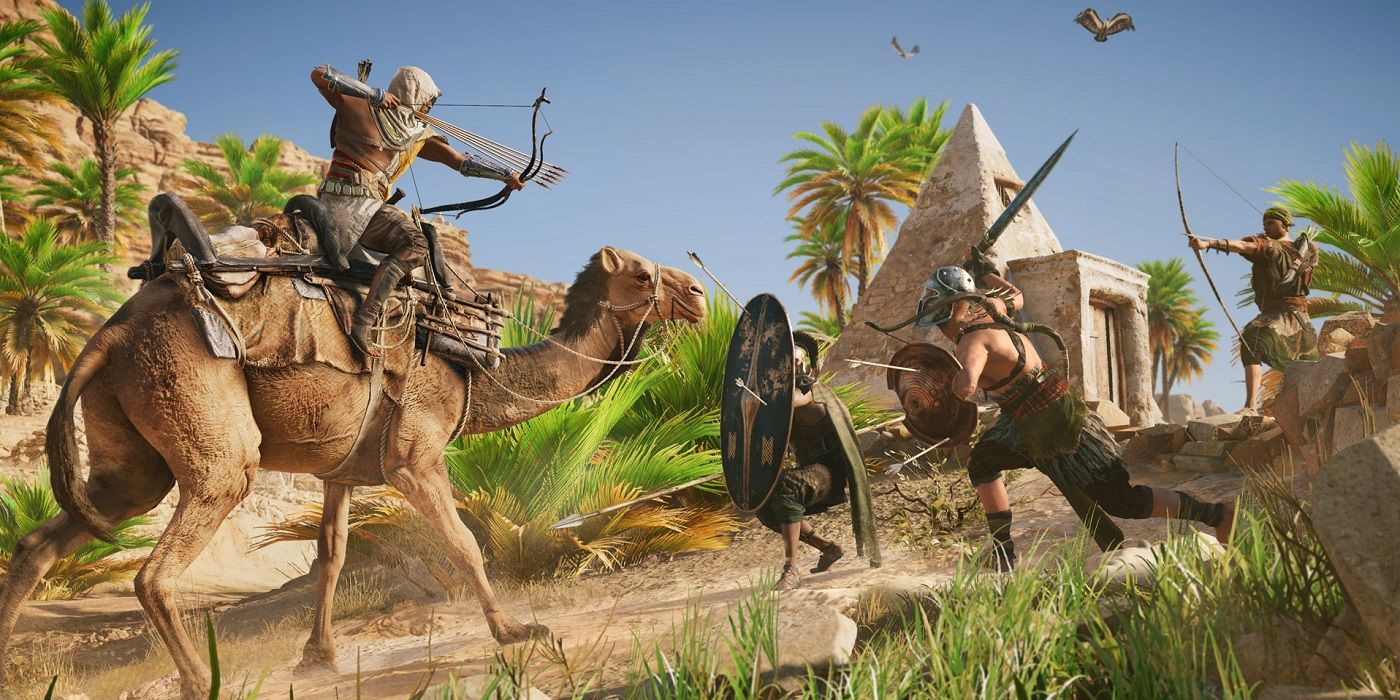Best Historical RPGs
Description

Summary
- Historical RPGs immerse players in meticulously crafted worlds of specific eras, allowing for player-driven choices that alter history.
- Expeditions: Rome, Kingdom Come: Deliverance, Crusader Kings 3, and Assassin’s Creed Origins offer complete historical immersion with agency.
- These games provide authentic settings, detailed narratives, and strategic elements, making them must-plays for history buffs and RPG enthusiasts.
These historical RPGs transport players into meticulously crafted worlds, challenging them to navigate the politics, battles, and daily struggles of real historical eras. This topic is dedicated to pure history RPGs, leaving fantasy hybrids aside to focus on games grounded in real-world periods.
Think of these games as the ultimate time machines: each one allows players to step into a bygone era, letting players experience the thrill of being a Roman legatus, a medieval blacksmith’s son, or the founder of a new dynasty. What truly sets these games apart isn’t just the settings or costumes—it’s the agency. Players’ choices ripple out, changing the course of wars, dynasties, and sometimes the fate of empires.
Expeditions: Rome
Player-Driven Power Struggles In An Alternate Rome
Expeditions: Rome drops players into the chaos and intrigue of the Late Roman Republic, but hands them the reins to rewrite the script. Stepping into the sandals of a young Roman noble, players command legions, navigate Senate rivalries, and brush shoulders with iconic historical figures like Cicero and Caesar. The game builds an extremely detailed world from authentic weapons to grand Roman cities, but the real magic is the freedom to make or break history.
Unlike some games that worship accuracy above all, Expeditions: Rome nails the vibe and atmosphere, then lets players take wild narrative detours. Want to shape Cleopatra’s fate or challenge the political machine of Rome? Players can make it happen here. The game’s tactical combat comes with its challenges and requires strategic thinking—think throwing oil, setting ambushes, and leveraging companion skills for a decisive edge. However, the sheer ambition and narrative weight alone make Expeditions: Rome a must for anyone who wants to stir up ancient politics.
Kingdom Come: Deliverance
An Uncompromisingly Realistic Medieval Life
For anyone who’s ever wondered what “real” medieval life was actually like, warts, hunger, and all, Kingdom Come: Deliverance is the perfect choice. Set in Bohemia, 1403, players aren’t heroes chosen by fate, but a blacksmith’s son thrust into civil war and revenge. There’s no magic, no monsters—just mud, feudal politics, and the never-ending need to eat, sleep, and wash bloody clothes. Warhorse Studios poured years of research into getting the details right: everything from castle layouts to farming routines is built from historical records and expert consultation.
The result is a world that feels stubbornly authentic, right down to the brutal, stamina-draining combat system that demands finesse and patience. NPCs go about their routines, forests feel hauntingly alive, and every interaction carries the weight of social standing or reputation. Choosing between stealth, combat, or smooth-talking can change how quests unfold, but this is no power fantasy. Henry is as likely to fail or flounder as he is to win. Kingdom Come: Deliverance is a must-try for players looking for complete historical immersion, with all its mud, misery, and glory.
Crusader Kings 3
The Ultimate Sandbox For Creating Medieval Drama
Crusader Kings 3 turns the medieval era into the wildest drama fans never knew they needed. Imagine a chessboard where every piece has a secret and a grudge. Instead of following a rigid story, fans pull the strings behind centuries of royal backstabbing, political gambits, and “accidental” deaths in the family tree. From the year 867 or 1066, guiding a lineage means marrying off heirs, sealing alliances, and watching every throne for a knife in the dark.
The game’s attention to real history stands out: every faith, culture, and county is mapped with impressive care. But what keeps fans hooked is the chaos that unspools after the first few moves. One clever bribe or a poorly timed betrayal can send dynasties tumbling. Crusader Kings 3 simply lets players step out of a pre-written story and become its author, making each campaign a truly personal journey.
Assassin’s Creed Origins
Explore Ancient Egypt’s Living Museum
Assassin’s Creed Origins took a beloved franchise, tossed the old playbook, and reimagined itself as a historical RPG—a move that no one saw coming. Set during Ancient Egypt’s Ptolemaic era, the game tells the founding story of the Assassin Brotherhood through its compelling protagonist, Bayek of Siwa. The game’s world feels genuinely alive: Alexandria buzzes, temple columns scrape the sky, and every oasis hides a bit of mystery.
The research behind this world is so thorough that it even birthed the “Discovery Tour,” a feature that ditches combat and turns the map into a museum, complete with historian-guided strolls through pyramids and back alleys. NPCs don’t just stand around—they shop, pray, even argue, all on their own. Every monument and market square invites a closer look, and it’s hard not to get lost wandering. Origins proves that historical RPGs can educate and entertain at the same time, making fans feel like both tourists and adventurers.
Mount & Blade 2: Bannerlord
The Ultimate Medieval Sandbox With Player-Led Conquest
Mount & Blade 2: Bannerlord hands fans the keys to a medieval sandbox—and then lets them run wild. Although it takes place in a fictional realm, the game itself is heavily inspired by the real world and lacks fantasy elements. Starting as a nobody, there’s total freedom: join tournaments, trade goods, pledge allegiance, or just carve a kingdom out of chaos. Whereas, if players want to rule from the shadows, then they can scheme and build alliances.
Battles are chaotic, intense, and massive—hundreds of troops clashing in real-time, with players riding right into the thick of it, shouting orders, and truly feeling the rush (and terror) of medieval warfare. Bannerlord’s greatest trick is making every campaign feel handcrafted. Ambitions are rewarded (or crushed), and the journey from wandering sellsword to crowned monarch never feels the same.
Honorable Mention: Ghost Of Tsushima
Ghost of Tsushima isn’t strictly categorized as an RPG; rather, it contains elements of that genre throughout its primarily action-adventure lens. However, history buffs interested in RPGs may still be interested in taking the game for a spin, since it’s an excellent game.
Ghost of Tsushima is a love letter to samurai cinema. Set during the first Mongol invasion of Japan in 1274, players become Jin Sakai, a samurai torn between tradition and desperate guerrilla tactics. The world is lush, stylized, and cinematic: think Akira Kurosawa with a PlayStation budget. The gameplay is centered on a fluid and lethal melee combat system.
A key feature here is the stance system, which requires players to switch between four fighting styles to effectively counter different enemy types. Immersion is the game’s greatest strength, achieved through its breathtaking, painterly art direction and its innovative “Guiding Wind” navigation, which replaces a traditional mini-map with environmental cues that encourage players to observe the world. Ghost of Tsushima is proof that historical epics can be both tribute and transformative—making players feel like they’re starring in the greatest samurai epic.




